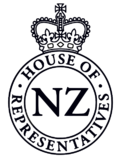| Leader of the House | |
|---|---|
 | |
| Appointer | Governor-General of New Zealand |
| Term length | At His Majesty's pleasure |
| Inaugural holder | David Thomson |
| Formation | 13 December 1978 |
| Deputy | Louise Upston |
In the New Zealand Parliament, the leader of the House is the government minister appointed by the prime minister to be responsible for the management of Government business in the House of Representatives. This includes determining the order in which the Government's legislative agenda will be addressed in the House. The leader of the House is also an ex officio member of the Parliamentary Service Commission.














